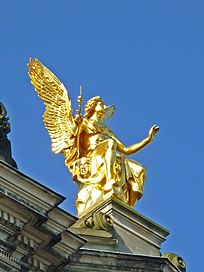Phantasos

In Ovid's Metamorphoses, Phantasos ('apparition' 'fantasy' from Ancient Greek: φαντασία, phantasíā, 'appearance' 'imagination')[1] is one of the thousand sons of Somnus (Sleep). He appeared in dreams in the form of inanimate objects, putting on "deceptive shapes of earth, rocks, water, trees, all lifeless things".[2]
According to Ovid, two of his brothers were Morpheus, who appeared in dreams in human form, and one called Icelos ('Like'), by the gods, but Phobetor ('Frightener') by men, who appeared in dreams in the form of beasts.[3] The three brothers' names are found nowhere earlier than Ovid, and are perhaps Ovidian inventions.[4] Tripp calls these three figures "literary, not mythical concepts".[5] However Griffin suggests that this division of dream forms between Phantasos and his brothers, possibly including their names, may have been of Hellenistic origin.[6]
Notes[edit]
- ^ φαντασία. Liddell, Henry George; Scott, Robert; A Greek–English Lexicon at the Perseus Project.
- ^ Griffin, p. 249; Tripp, s.v. Somnus, p. 534; Ovid, Metamorphoses 11.641–643.
- ^ Griffin, p. 249; Ovid, Metamorphoses 11.638–641.
- ^ Griffin, p. 249.
- ^ Tripp, s.v. Somnus, p. 534.
- ^ Griffin, pp. 179, 249.
References[edit]
- Griffin, A. H. F. (1997), A Commentary on Ovid, Metamorphoses XI, Hermathena, vol. 162/163, Dublin, JSTOR 23041237
{{citation}}: CS1 maint: location missing publisher (link). - Ovid. Metamorphoses, Volume II: Books 9-15. Translated by Frank Justus Miller. Revised by G. P. Goold. Loeb Classical Library No. 43. Cambridge, Massachusetts: Harvard University Press, 1916. Online version at Harvard University Press.
- Tripp, Edward, Crowell's Handbook of Classical Mythology, Thomas Y. Crowell Co; First edition (June 1970). ISBN 069022608X.
External links[edit]
 Media related to Phantasos at Wikimedia Commons
Media related to Phantasos at Wikimedia Commons
